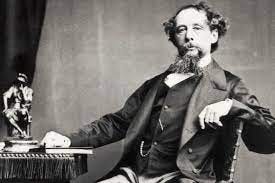Our Mutual Friend
Revisiting Charles Dickens, half a lifetime later
Greetings from London, where I am fortunate to have my school foot the bill for me to explore the English roots of New England. So it is that I am visiting places like Boston, and Cambridge, and Greenwich, all inspiration for their American cousins. The hope for my employer, as well as myself, is that such experiences will deepen my teaching, which has included forays into Puritanism as well as the rise of suburbia (Another one of my destinations, Clapham Common, which is now a leafy neighborhood of London, generated the template for bourgeois utopia as a small town on the metropolitan fringe in the late eighteenth century.)

One fruitful diversion of this enterprise has been a re-engagement with Charles Dickens. Dickens was—and still is—one of those people you read in high school, sort of like Mark Twain, who got relegated to the realm of juvenile literature (though of course The Adventures of Huckleberry Finn has now become even more fraught than it was when it was first published in 1885—I am greatly cheered he has retained his capacity to offend). Some years back I re-read A Tale of Two Cities and was struck by its interpretive sophistication about the French Revolution, which threaded its energetic plot. I recently finished a second reading of Great Expectations, which I will be team-teaching this fall in a course on the semiotics of social status, and was moved by its emotional richness. I took along David Copperfield on this trip, which I had never read, and have found it to be excellent company on my solo mission. (It will set me up to read Barbara Kingsolver’s The Demon Copperhead, which just won the Pulitzer Prize for fiction.)
By coincidence, the hotel I chose in Bloomsbury is less than a mile away from the Charles Dickens Museum, located in the house where he lived when he began his career as a novelist and wrote his classic Oliver Twist. The hotel is also down the street from the house, now long gone, in Tavistock Square where Dickens spent a fruitful decade in the 1850s. Visiting the neighborhood—then, as now, an enclave of affluence—serves as a useful reminder that Dickens was a media superstar (and yes, a comparison to J.K. Rowling, who like Dickens is an inveterate serializer of her fiction, makes a lot of sense). Though he wasn’t yet rich, he had justified confidence in his ability to meet popular demand, which proved to be very profitable work indeed, even if he was perpetually exasperated by the intellectual property theft of Americans who published pirated editions of his novels.
Walking through his dining room and parlor, and learning about his childhood and that of his wife’s family, also brings a more subtle reality into focus. We all know that part of what made Dickens’s searing critiques of Victorian savagery so powerful is that he knew such savagery first-hand: his father’s improvidence, vividly captured by the incorrigibly likeable Wilkins Micawber, was the reason the deeply impressionable child found himself working in a boot polish factory when he was twelve years old. But some of Dickens’s outrage seems to have been rooted in his own great expectations: his parents were part of a rising middle class in Great Britain that included his future father-in-law, a powerful Scottish newspaper publisher. (Dickens had a thing about lawyers in particular, and crafted some memorable ones.) He was subjected to child labor, but he was also educated, notwithstanding the wretched brutality of the English educational system that was still being flogged less convincingly by Pink Floyd a century later in The Wall. It was such frictions between expectation and reality, hope and fury—which of course is not quite its opposite—that drove Dickens’s best work. His credible depictions of venality and cruelty gave his portraits of generosity and love—not to mention humor—their indelible power that can still bring one to tears. Of course, by modern standards Dickens can seem sentimental, but has anyone generated as vivid a gallery of characters that include the Artful Dodger, Ebeneezer Scrooge, Uriah Heep, or Madame Defarge?
The dictates of the cultural structures of his time can make his work seem formulaic. But were he alive today, Dickens would very likely be publishing his work on Substack and making a lot of money on it. We are not simply creatures of our cultures in terms of permissible topics and emotions, but also in the structures, economic and otherwise, that shape our sense of the possible, which is why our most gifted artists are often the ones who perceive shifts in how technology creates new possibilities for culture, which in the case of Dickens involved the role of mass distribution in an increasingly literate, and entertainment obsessed, Anglo-American society. He was a thoroughly modern man. He also reminds us of how evanescent our notions of modernity really are. And how durable really good stories can transcend them.


Thank you for adding color and substance to my understanding of Dickens. I am happy you are there exploring his roots and London writ large.
In 2015, the American Council of Trustees and Alumni (ACTA), formerly known as the National Alumni Forum (NAF), issued a report entitled “The Unkindest Cut: Shakespeare in Exile 2015.” It is an examination of 52 of the national universities and liberal arts colleges rated highest by U.S. News & World Report. The results? Only Harvard University, the University of California-Berkeley, Wellesley College and the U.S. Naval Academy require English majors ( read that again, ENGLISH MAJORS) to take a course focused on Shakespeare. Of the holy Trinity (Shakespeare, Chaucer, Milton) I would consider the Bard to be the most accessible to the masses and the most heart stirring. Safe travels Jim.